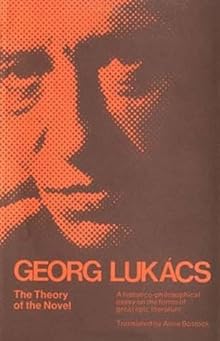I know very few are interested in the wonky lit crit books I'm assigned for my graduate school classes, but I want to blog every book I read, so I'll keep this brief. Georg Lukacs' The Theory of the Novel seeks to explain why we read and write novels, when once we wrote epics. The short version is that "The novel is the epic of a world that has been abandoned by God."
A longer explanation would show that our fundamental relationship to the world is not what it was for the Greeks, whose "answers came before their questions." The rift that occurs between our interior selves and our exterior world makes our adventures ones of interiority, of struggling against the paradox of having to live in an unknowable world, unlike the epic heroes who are "only the luminous centre around which this unfolded totality revolves, the inwardly most immbole point of the world's rhythmic movement." Something similar is described in Josipovici's Whatever Happened to Modernism?, but more lucidly.
That, so far, I think I understand. But Lukacs' attempts to provide a more nuanced schematic of the novel tend toward utter impenetrability. There are too many sentences like this one:
The world of distances lies sprawling and chaotic beneath the radiant celestial rose of sense made sensuous; it is visible and undisguised at every moment.
I won't front. I don't have the first idea what that means. Lukacs' foreword basically recants the book in its entirety, saying that in retrospect it was bad form to make generalizations and then try to fit individual examples to them. But The Theory of the Novel is, as far as I can tell, almost bereft of any real evidence that might clarify thoughts like the ones above. When it does discuss real literature, as in late chapters on Goethe's Wilhelm Meister and Tolstoy, it does so only in the most abstract way possible. I teach my high schoolers that the most important skill they can develop in writing about literature is the ability to support their argument with textual evidence. Is that too much to ask of Georg Lukacs?


2 comments:
This sounds like a very confusing texxt.
Yes, I noticed the same thing while reading it. He almost never referred to a specific book, only to authors: "Dante", "Homer", "Goethe". He seemed to have read about a dozen books, just enough to refer to their authors by name over and over. The things he claimed about these authors were so vague and incoherent that I couldn't say whether Lukacs was correct even when I could ascribe any meaning to them. He regularly spoke of "Homer" without distinguishing between the Iliad and the Odyssey. The books are so vastly different--an epic work of philosophy versus a boy's adventure tale--that the failure to distinguish between them makes hash of his main thesis.
He may have had something worthwhile to say, but the book has all the earmarks of some grand theory merely intuited, not formed from a close and long-term engagement with literature, and not defended by any examples from it.
Post a Comment